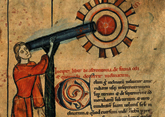  
    


| Treatise on Astronomy, 14th century manuscript. © Superstock, Inc. |
|
 |
|
|
|
 ost of us understand, that during the last two centuries, scientific research has accelerated our knowledge of the physical world many times over. We have powerful new medicines, improved strains of crops and a stunning array of digital technologies at our fingertips. ost of us understand, that during the last two centuries, scientific research has accelerated our knowledge of the physical world many times over. We have powerful new medicines, improved strains of crops and a stunning array of digital technologies at our fingertips.
What is easy to overlook is the effect all this scientific knowledge has had on human perspective. It was only in the 20th century that new galaxies were discovered. At last count, we find ourselves in a universe of at least 100 billion galaxies, each comprised of 100 billion stars. Science shows itself to be a guiding tool in a wondrous loop: the more we look, the more we see.
But our expanding vision is not limited to the cosmos— far from it. It goes inward too; is there anyone alive who is not stunned upon first learning that matched to the 100 billion stars in our galaxy there are 100 billion neurons in each of our brains? Even the most literal thinkers among us cannot fail to grasp the poetry of this galaxy within a galaxy. Many influential thinkers believe that in the next 100 years, as neuroscience continues to make progress, the brain’s core contents, its ideas, values, emotions and beliefs, will, for the first time, be drawn under science’s clarifying lens, ultimately changing our understanding of almost everything, including ourselves.
Take the case of the research being done at the Oxford Center for Science of the Mind, led by neuroscientist Baroness Susan Greenfield. There, she and her colleagues are using high tech brain scans in a laboratory environment to examine how personal belief physically affects our brains. “Do different people’s brains respond differently according to the beliefs they do or don’t hold?” asks Baroness Greenfield. “The short answer is, of course, we don’t know until we’ve tried it… For the first time to actually have a theologian talking to brain imaging experts, which we have, will give us some insight. It won’t give us all the answers immediately, but what is wonderful is it will be a start.”
Indeed these big essential questions, once considered the sole domain of priests and philosophers, are now being addressed by scientists around the world, many of them supported by the Foundation. These are not simply questions for our time, but of all time: What is the origin of the universe? What does it mean to be human? What is the nature of free will?
But what of religion? What of spirituality, theology and the meaning found in life? During the same period that marks science’s accelerated growth, our evolving understanding of spiritual knowledge such as love, forgiveness, hope and generosity have not expanded at the same rate. But suppose we looked through the lens of science at the unseen world in order to accelerate our understanding of the spiritual elements of reality? “What can we learn about life,” asks the Foundation’s Senior Vice President Charles Harper, “if we study the living world and its history from a perspective open to the dimension of purpose and meaning?” Those who accept this premise will argue that the spiritual elements of reality are as important as the physical. Some
would say more so.
The core mission of the Foundation grows from this thought. It is supported by a distinguished worldwide board of advisors of 100 people ranging across all religious traditions and representing 30 nations.
|
|
|